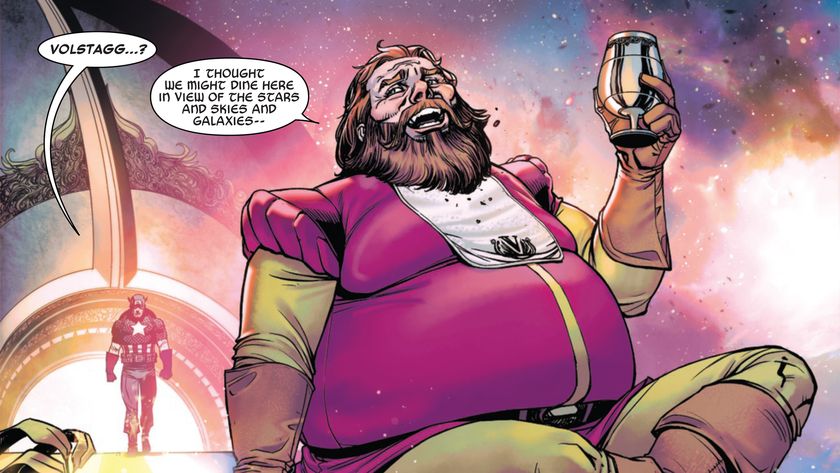Puzzle Kingdoms is super hardcore
Puzzle Quest spin-off takes the next step in puzzle-RPG evolution
Last year, Puzzle Quest: Challenge of the Warlords became an unlikely addiction for a ton of otherwise hardcore gamers. Seamlessly blending the casual gameplay of Bejeweled with traditional RPG mechanics like leveling, turned-based battles, magic attacks, and a decent story (for those who paid attention), Puzzle Quest practically introduced a new genre. Now, Infinite Interactive, the developer that created Puzzle Quest, brings us another game of the same ilk - Puzzle Kingdoms – another puzzle-RPG blend that takes place in the same world as Puzzle Quest.
As much as we love Puzzle Quest, with two releases under its belt (Puzzle Quest: Challenge of the Warlords and its expansion, Puzzle Quest: Revenge of the Plague Lord) and one on the way (Puzzle Quest: Galactrix), we’re afraid the franchise might already be in danger of stagnation. So we wanted to know, what makes Puzzle Kingdoms any different? Read on to find out how Kingdoms is attempting to take the Puzzle-RPG genre to the next level.

You've finally got your hero to level 40 after hours of sidequesting and you're sort of starting to regret choosing the Warrior class (yes, Druids are way better). Bummer. Classes still play a large part in Puzzle Kingdoms, but instead of being stuck with just one hero, you can collect a whole roster of them to level up and customize as you choose. You could even have one of each class if you wanted.
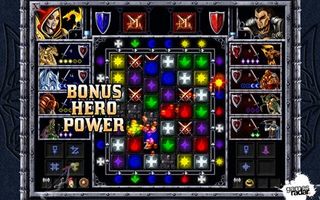
This means that you can choose your hero strategically based on the type of enemy you're fighting. You can also stack your heroes in order so that if one falls, the next can step in and take over the battle.

Again, we can't overstate how much we love Puzzle Quest, but sometimes we can't help but feel it's a guilty pleasure. Let's face it – it's still basically Bejeweled. Kingdom's puzzles look familiar; you’re still matching colored tiles (six colors in all), which earn you mana that allow you to attack your opponent, and you can still do direct damage by matching attack gems (in this case, they look like swords rather than skulls).
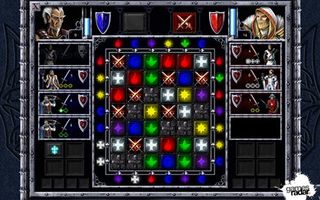
Above: Push entire rows/columns over one by selecting the coloredicons on the edges of the puzzle. Empty spaces (grey areas) give tiles room to move
But there are a few key differences that set Kingdoms apart. The most obvious is that you no longer have to match tiles in rows – any tiles that share a side will form a match. Less obvious, but perhaps more importantly, you no longer have to make a match to make a move. In Puzzle Quest, only moves that make a gem match are valid; if you fail to make a match you’re penalized and lose your turn. Here, you’re not limited by having to match tiles each turn – if you have a larger strategy in mind, you can use your turn to shuffle pieces accordingly. This frees you up to think more about long term strategies, meaning you don’t just have to figure out what the best possible move is right now, but consider layers of moves.
Sign up to the 12DOVE Newsletter
Weekly digests, tales from the communities you love, and more

Instead of simply having a roster of spells to choose from, Puzzle Kingdoms allows you to recruit different types of troops to assist you in battle. In the demo we saw, troops seemed to function somewhat similar to how spells did in Puzzle Quest – each unit (soldier, peasant, archer, etc.) takes up one slot in your hero’s inventory, and each needs a specific amount of mana to attack.
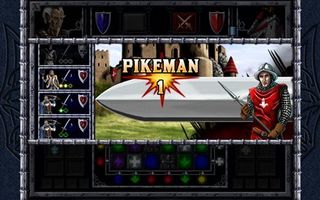
Above: Pikeman will eff you up. He will cut you
But instead of simply being analogous to a list of attacks, troops have additional properties to take into account. Soldiers can only attack enemy units in the front of your enemy’s queue, while archers’ attacks can reach any of the enemy’s troops, although it’s random which unit gets hit. You even have to be strategic about how you order your units in battle – landlocked units (e.g. foot soldiers) at the top of the queue are going to get hit with enemy fire first. Do you throw a bunch of cheap-to-deploy meatshields in first, or risk a more costly unit in the hopes he can withstand enemy forces and protect the other troops?

While it does retain many of the core gameplay mechanics as Puzzle Quest, Kingdoms has an added depth that’s clearly geared toward serious gamers. Resource allocation plays a bigger role – it actually costs money to deploy troops, and when you lose them they’re gone for good. You can’t just play willy-nilly and barely eke out wins, because you’ll run out of money if you’re throwing troops away needlessly.
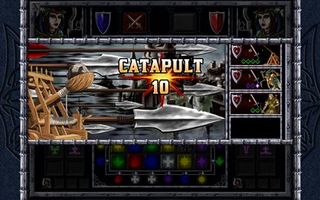
Above: We hear the covetedtrebuchetalso makes an appearance
You can also load units up with powerful equipment, but that costs money too, so how much do you spend on each? There’s definitely a lot more wiggle room to explore different strategies here, but to what extent this affects the gameplay is still hard to say.
We’re still uncertain if Puzzle Kingdoms will match the sheer addictiveness of Puzzle Quest, but we’re certainly eager to see more. Look for more coverage here as we get closer to its early 2009 expected release, but until then,headherefor exclusive screens of the puzzle action.
Sep 9, 2008
Most Popular







